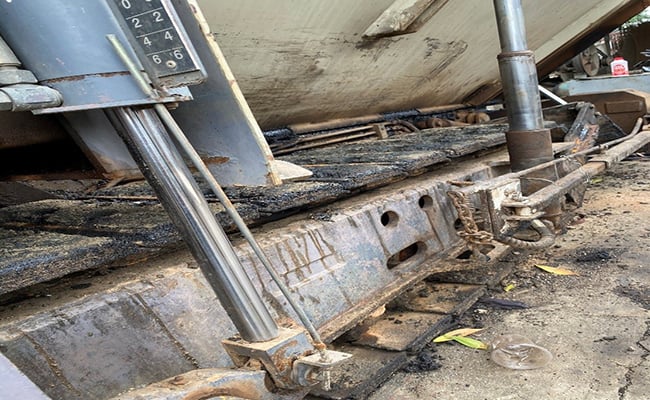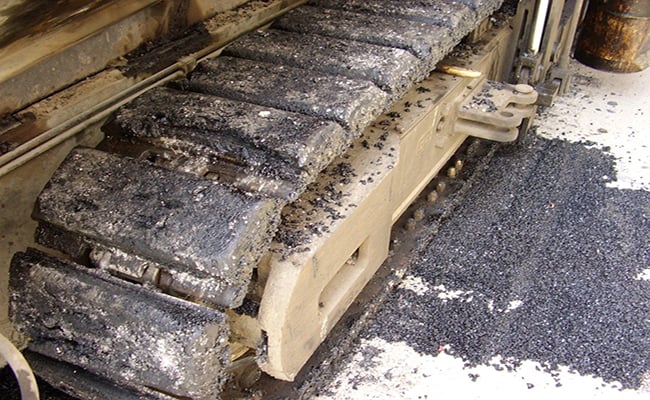Rubber Track Pads
Feature
1. Special chamfer design allows wasted material reject smoothly, increasing in rubber pads lifespan.
2. Rubber material provides better shock absorption performance than polyurethane, bringing better protection for the rest of chassis parts.
3. Rubber pads are highly wear resistance, unlike the polyurethane pads, which are going to peel off a large surface area, rubber pads will only damage the specific small area.
Advantages
1. Our rubber material is flexible and able to resist tearing and aging, also provides better crawling grips.
2. Built-in plate provides better colloid holding force, our rubber pads are tough, robust and not easy to fall-off even under steering maneuver or hill climbing.
Working Hours
1. 5000 hours for excavator under normal using conditions.
2. 3000 hours for paver under normal using conditions.
User's Manual
Due to the complexity of road construction project, it requires rubber track pads to increase the contact grip and to also provide better protection for undercarriage system. Improper machine operating will cause damage to certain parts and the possibility of breakage and damage. Therefore, if operator can follow the tips below,it is expected to increase the lifespan of rubber track pads.
The possible cause of damaging and precautions
1-1 Contamination of chemicals, lubricant oil or sea water
In this situation will cause the rubber pads aging and erosion rapidly if not properly after use.
Avoidance: Clean with water or refresh the pads with sand if required.
1-2 Walking on sharp protrusions pavement (Ex. steel bars, stones, etc.)
The sharp edge will rise the contact point pressure extremely, exceeds the shear force of rubber material resulting in damage and peel off.
Avoidance: Remove the sharp obstacles, if its unmovable, the sharp edge needs to be cover or smoothen as much as possible.
1-3 Road curbs or uneven road surface
It is most likely to damage the rubber pad’s edge. Uneven road surface will increase the chance of trackpad slipping.
Avoidance: The operator should avoid collision with road curbs. If trackpad slipping is detected, the machine should stop walking immediately. Once the problem solved can start again.
1-4 Hop-on & hop-off the truck
The slope for machine to hop on & off is usually built in steel bars in order to provide better grips while climbing. However, the better the grips also increase the contact pressure onto the rubber pads. Once the pressure exceeds its shear force, the rubber will be damaged. Generally, the more often hop on & off the truck will wear the rubber pads more quickly.
Avoidance: Remove the steel bar sharp edge.
1-5 Road surface with gutter cover, stepped pavement or uneven junction of highway bridge.
When paver machine walks through stepped road surface, it is likely to cause the track pad slipping, or even damage rubber pads due to increased surface contact pressure.
Avoidance: Pour enough sand or asphalt in front of the step to make the uneven step into a small slope in order to avoid this situation.
1-6 Residual asphalt on rubber pads
When the paver is paving asphalt and the adhesion of the asphalt on the trackpads cannot be clean before use. After the asphalt adheres to the rubber and walks again, the asphalt will peel off the rubber surface causing damage, especially customers who are using modified asphalt nowadays, the viscosity is stronger, resulting more damages to the rubber pads.
Avoidance: The asphalt dropped out by the material truck during construction need to be clear away as much as possible to avoid adhesion on trackpads.
1-7 Frequent and sharp steering
Steering is also one of the most damaging reason for rubber pads. Most of the current paver can achieve fixed-point steering. If there are foreign objects, stones or asphalt particles on the fixed side of the steering, the trackpad will likely to be damaged. Therefore, the frequently steering will also cause more wear of the trackpads.
Avoidance: Try to keep the ground flat without any foreign objects when steering the machine.
1-8 Paving stabilized soil or water-stable layer and other subgrade works
The roadbed construction is the most intractable environment in the paving project. As shown in Figures 1-2 and 1-3, the paver is easily to be damaged as soon as it turns, so the life of the trackpad paving this project is the shortest.
Avoidance: Because the environment of the construction site is relatively tough, it can be avoided if possible to maintain the maximum life of the trackpads.
1-9 The qualification of machine operator
The operator is also one of the critical factors regarding the service life of the paver. Improper setting or control will cause damage or breakage of the trackpads or other chassis parts.
Avoidance: Inform the above precautions, the damage of trackpads can be avoided.
Quality analysis
2-1 Contamination of the rubber build-in plate or fail of bonding strength
In the production process, the rubber pad most afraid the contamination of the built-in plate or the problem of the rubber adhesive. Once these problems occurred, the track shoe is transported to the construction site, even if the working time is short, it will damage straight away when walking after being installed. We commonly call it . The appearance of the damage is easy to judge. There is not much damage to the rubber body, and there is no rubber adhesion on the built-in plate. This phenomenon is a quality problem, usually only a few pieces.
Please refer to the following picture:
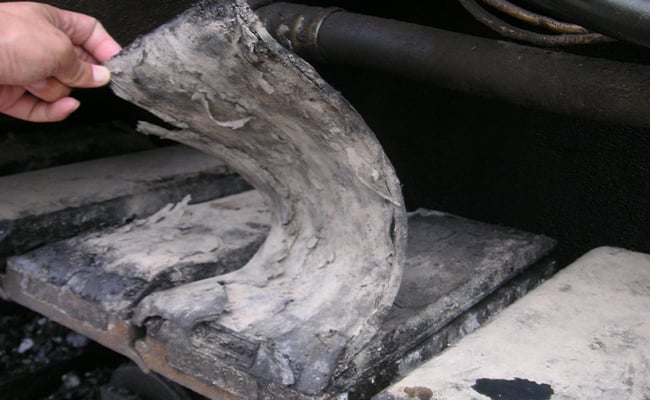
2-2 Rubber quality issue
As shown in the figure: the quality of the rubber will cause flaking and cause the whole piece to separate from the built-in plate.
Please refer to the following picture:
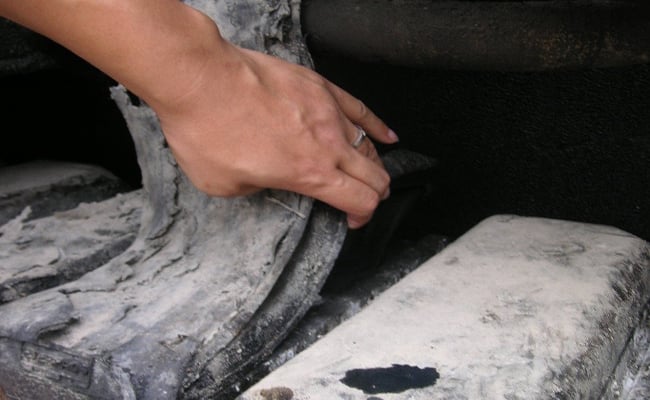
2-3 Trackpads worn out normally, about 1-year usage.
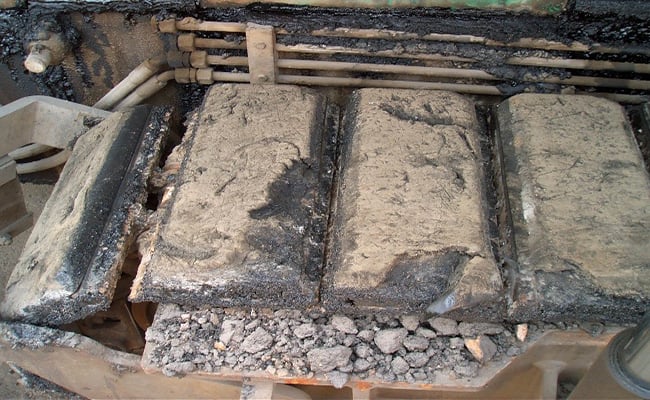
2-4 Trackpads worn out normally, about 2-year usage.
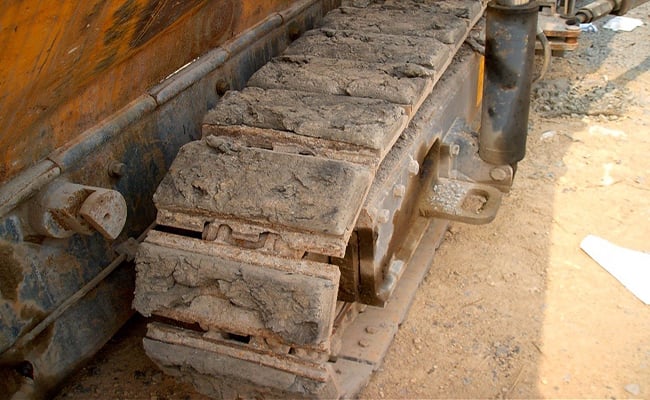
2-5 Asphalt adheres to trackpads and started to damage the rubber surface
